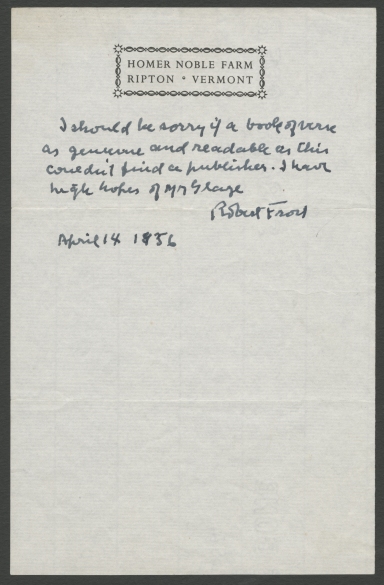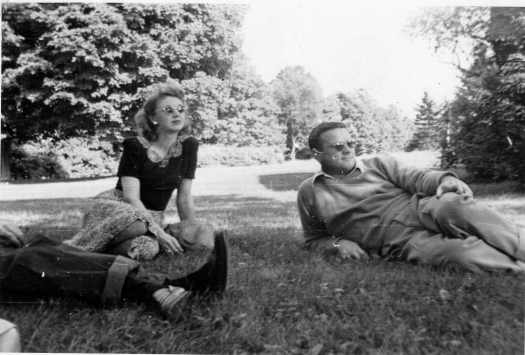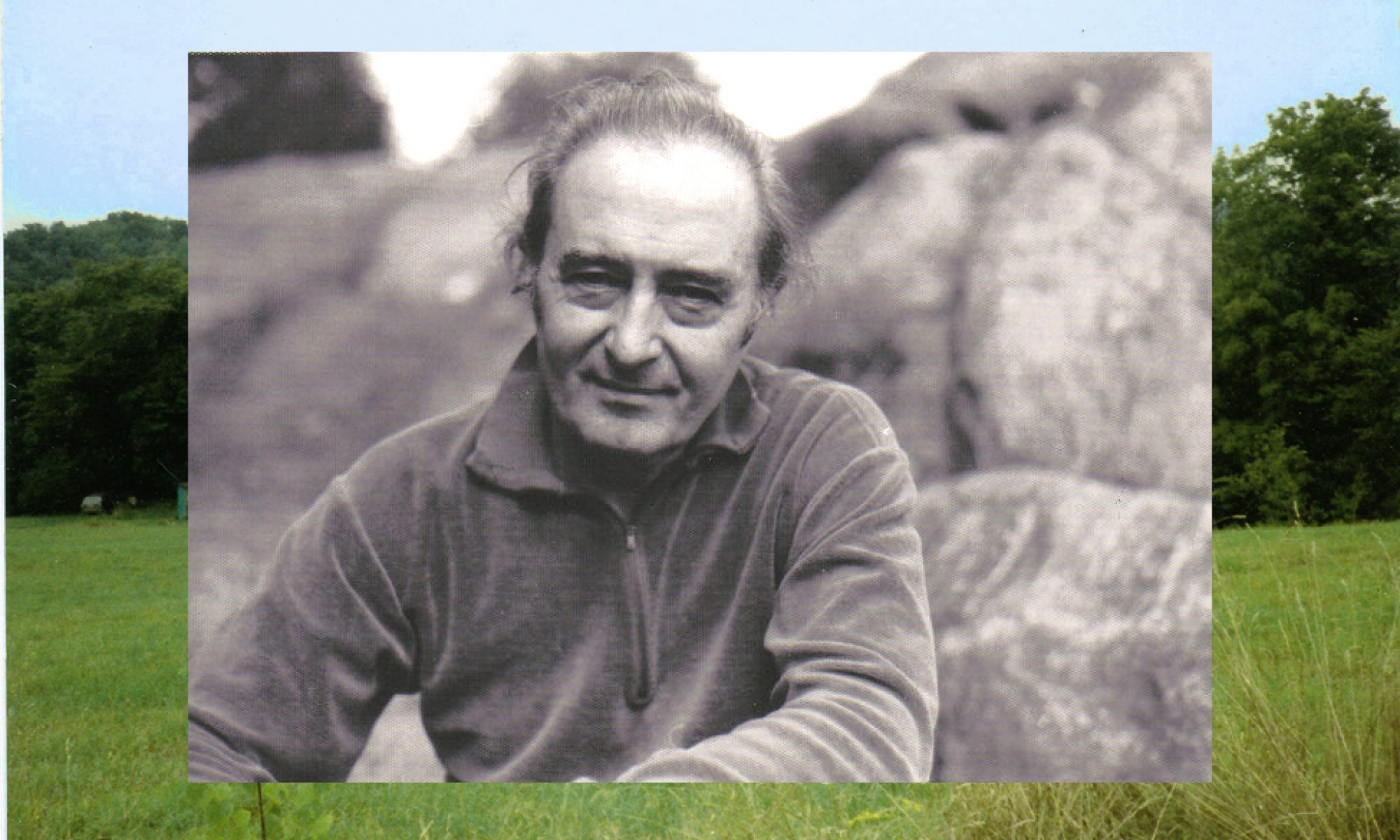An undocumented biographical note
Mister Frost, like most champions of the prize,
was a large person, towering over the miniscule
poets skittering about the local minstrelsy.
One day, a gaggle of them,
worked out a magisterial moment for him to meet
an ancient rebel confederate; it was said,
alive on this earth a hundred and seven years.
They wished to scrabble up the usual TV detritus
about a New England bard discussing
the unlikelihood that there was a still extant
rebel miner, out in the dumps and pea patches
of the Appalachian crags. —But when they got there,
they found it was only an old black man
of a hundred and seven years who lived in a wooden
piano box on half an acre of ravine
covered in pine slash, out Jasper way.
He raised a dozen chickens, had a hacking cough,
and the two of them got talking what it meant to be old.
“You’ve got to keep moving,” said Mr. Frost.
“Else your bones will freeze,” agreed the old man.
“How do you eat?” said Mr. Frost.
“Oh, that ain’t so hard,” the centenarian replied.
“I use my welfare to buy me chicken feed,
and I has an egg for breakfast, lunch and dinner.
It wouldn’t be so bad if it wasn’t for my lungs,
they awfully full of itchy dust from the mines.
It seems like nothing but whisky will cut the dust.”
Mr. Frost ruminated a moment,
then held up his hand as if someone
had started to speak. “The principle is,” he said,
“that I think we should leave this gentleman alone.
He’s got his life pretty well licked into shape,
and as a pledge of concern and farewell,
I’ll buy him a bottle of whisky,” said Mr. Frost.
By Andrew Glaze, Copyright 2015, from “Overheard In A Drugstore”.
Finally officially published in 2015, my father’s first drafts of this poem started as far back as the 1950’s. Early versions of it were donated to the Harvard Library along with paperwork from his first published book, Damned Ugly Children.
Adventures with Robert Frost
It all began at Harvard, when my father’s English and Poetry professor kept seating him beside Robert Frost during dinners at Leverett House. It was 1938, and Leverett was the dorm house for the English Major students. To this day, all of the residence buildings at Harvard have their own dining room and food service. From what I was told, Frost came on an almost monthly basis as a “Guest of Honor”.
My father had his own theory about the monthly seating arrangement. He said that he was very shy and a good listener, while Frost loved nothing more than to have an admiring audience. The monthly dinners were the equivalent of a supper club where Frost held court. For that reason, despite having four years of undergraduate dining opportunities to mention his own poems to Frost, my father never said a word about them. It was a perfect match.
My father’s English and Poetry professor was Theodore Morrison. Ted also became his first mentor. At the same time, Morrison maintained a supportive friendship with Robert Frost, which was why Frost came to dinner on a monthly basis. And when Frost’s wife died in 1938, Ted’s wife became Frost’s secretary. Both of the Morrison’s looked after Frost in his older years to the point of agreeing to move into his main house along with their children, while Frost happily moved into a small three room cottage on the property. Frost would join them for meals and family time, and then head back to the cottage to work. His own children were adults by then.
In 1942, World War Two was in progress. My father graduated, joined the army, and was deployed to Europe. Upon his return, he received a Fellowship for the Bread Loaf Writers’ Conference of 1946. Hosted by Middlebury College in Vermont, the Conference is the oldest in the US, and one summer week long. Its 1926 inception is closely associated with Robert Frost, who lived nearby and attended 29 of the summer sessions. The 1946 staff included Frost, Ted Morrison, and Wallace Stegner. My father knew them all from Harvard. William Styron is listed as a “student” that year. Everyone at the conference was either already known or about to become known.
On a side note, Stegner moved from Harvard to Stanford in 1945, and 1946 is when he founded Stanford’s “Creative Writing Program and Writing Fellowships” (now called “Stegner Fellowships”). To quote Stanford’s website, “Notably, the Writing Fellowships were particularly aimed at WWII-era returning servicemen. ‘I arrived at Stanford just as the GI students were flooding back,’ Stegner said. ‘Many of them were gifted writers. They had so much to say and they had been bottled up for two or three or four years. They were clearly going to have to be handled somewhat differently from the ordinary 18-year-old undergraduate.’ Stegner writes that it was Eugene Burdick’s short story entitled “Rest Camp on Maui” (published in Harper’s Magazine and winner of the second prize in the O. Henry volume for 1946) which was ‘the beginning of everything’.” From that point on his program was secured with sponsorships and an endowment.
Coming across the information about Stegner’s start-up program for returning servicemen has helped me to understand how, why, and when, my father ended up going to Stanford University. The book Wallace Stegner: His Life and Work by J. J. Benson reveals “After his first year at Stanford, he was so impressed with Eugene Burdick and another student, Jean Byers, that he took them to Bread Loaf with him as Fellows, and when he came back to Stanford, he brought with him two Fellows that had impressed him at Bread Loaf”. One of those two was my father. An autobiographic history by my father says, “I did six months of graduate work at Stanford. But it finally came to me –why? I didn’t want to teach. … So I threw up graduate work and came home to Alabama”. Teaching had been his original plan; the paragraph below his Senior Class photo in the 1942 Harvard Year Book said so.
Meanwhile, back at the Bread Loaf Writers’ Conference of 1946, judging by the number of photos my father took, my father hit it off as friends with Eugene Burdick. I say this because most of the photos include Bud. My father’s papers also include letters from Bud. For this reason, I’m sure my father was upset when Bud eventually died in 1965 of a heart attack at the age of 46.
The photos also include the annual Bread Loaf Writers’ Conference Softball Game. This tradition came out of Robert Frost’s love of baseball, and was played on a field at his nearby farm. Players were made up of the staff, the Fellows, conference students, and visitors. Frost loved to participate and usually led one of the teams. Tactfully, the organizers made sure the strongest players were assigned to his side, so he almost always won.
My father made a repeat visit to Bread Load in 1948, and I have reason to believe he returned again in 1953. In 1969, after his first book was well reviewed and won an award, he was invited to return as a full-fledged Bread Loaf staff member. It must have seemed odd to no longer have Frost presiding over them; he passed away in 1961.
The story behind the poem “Mr. Frost” is based on fact and is an accurate depiction. Jasper is a small town just outside of Birmingham. In an 1985 interview with Steven Ford Brown, my father explained, “Once when coming through Birmingham on one of his reading tours, he had his host call me and ask to spend the day with him. (This caused considerable flusteration, since I was an insignificant young reporter). I always heard he was terrible with younger poets – jealous and disdainful, but he was good to me. Perhaps he didn’t think I was good enough to be a threat, and I never pestered him to read my manuscripts. That must have been a relief.” In later years, my father stated that the organizer for the outing was actually the owner of the newspaper he worked for. Also, that Frost came to Birmingham to do “An annual reading at Birmingham Southern College”, and was hosted by the Professor who organized the event. It was the baffled Professor who was charged with calling my father to invite him to spend the day with Frost.
As for the timing of Frost’s visit to Birmingham and the outing to Jasper, I’m guessing that it was after my father’s 1953 visit to Bread Loaf Writers’ Conference, but it may have been earlier.
My father eventually mentioned Frost in three of his poems. In his poem “Tick Tock”, he starts the poem with “Was it with Grandpa or Robert Frost I rode out to look for the way we lost?” And his poem “Old Poet”, which was written later in life, pays homage by repeating a final line,
“Or by what fork of the road,
or by what fork of the road.”
The surprising thing to me is that I grew up with zero awareness of my father’s acquaintanceship with Frost. Somewhere in adulthood I learned that Frost had been at the Bread Loaf Conferences. However, it wasn’t until one late night in 2010, by complete accident, that we discovered the existence of Frost’s note complimenting my father’s poetry (the note is reproduced below). I was trying to update my father’s bibliography. Whenever I needed a mental break, I’d type my father’s name into Google along with the name of another writer, and then add “+ Archive”. As soon as I typed “Robert Frost” into this equation, an OCLC World Catalog entry popped up. It said, ”Note, 1956, April 14, Ripton, VT, by Robert Frost.” “A favorable appraisal of the poetry of Mr. Glaze”. By the next day I had a scan of the note from the Dartmouth College Library. At this point I called my father to say, “Did you know that Dartmouth has a note from Robert Frost, saying that he likes your poetry?” There was stunned silence at the other end of the line.
Aside from excitement at discovering the note’s existence, my first emotion was gratitude that my father was still around to enjoy the news. The mystery of the note was solved by an online notation that read, “Gift of Kathleen Johnston Morrison, 1978”. Kay Morrison, the wife of my father’s late Harvard professor and mentor, and secretary for Robert Frost, had kept the note from 1956 until 1987. She donated it a year before her husband Ted died. She died a year or two later.
Ted Morrison remained my father’s friend and mentor for many years. Among my father’s papers is a letter from Ted, dated May 24th, 1954, giving him feedback on two poems in progress. One was “Ho Farragut!”, which appeared in The New Yorker one year later. The second, “A Cut of Copernicus”, appeared in Poetry in February of 1956 . The logical explanation for Frost’s 1956 note is that Ted asked Frost to take a look at poems he’d recently received from my father. Frost read the poem/s while sitting in his cottage, attached the note, and Kay returned it all to Ted in the main house. Ted and Kay kept the note, because they felt it was a trusted private exchange. Frost died in 1961, less than six years after writing the note. My father’s first book was published in 1965, and probably contains poems that Ted and Robert Frost read. My father dedicated the book “to Ted”.
Interestingly, in August of 2015, when my brother and I hosted a book launch for Overheard In a Drugstore at the request of the publisher, my brother read the poem “Mr. Frost” aloud. As he read, he happened to glance at our father sitting at the front of the audience, and realized he had tears streaming down his face. My interpretation is that he was remembering times he’d spent with Mr. Frost and Ted, and feeling grateful in the knowledge that his old acquaintances had believed in him all along.
—- E. Glaze

Used by permission of Middlebury College Special Collections and Archives.
Faculty and Fellows, 1946 Bread Loaf Writers’ Conference.
Rear L to R: Robert Frost, Robert Bordner, Graeme Lorimer, Andrew Glaze, Wallace Stegner, Rudolph Kieve, Theodore Morrison, Eugene Burdick, William Sloane.
Front L to R: Carol Warren Burdick, Kay Morrison, Helen Everitt, Mary Stegner.

“I should be sorry if a book of verse as genuine and readable as this couldn’t find a publisher. I have high hopes of Mr. Glaze.”
(Reproduced by permission of the Robert Frost Estate.
Photo courtesy of Rauner Library at Dartmouth.)

Andrew Glaze with bat on shoulder, Ted Morrison facing camera, John Ciardi with bat on ground. Photo property of the Andrew Glaze Estate, 2018.
 “Jean Byers and Bud Burdick”. Photo by Andrew Glaze, property of the Andrew Glaze Estate, 2018.
“Jean Byers and Bud Burdick”. Photo by Andrew Glaze, property of the Andrew Glaze Estate, 2018.
 “Wally Stegner, Ted Morrison, Robert Frost. Bread Loaf Writers’ Conference, 1946”
“Wally Stegner, Ted Morrison, Robert Frost. Bread Loaf Writers’ Conference, 1946”
Photo by Andrew Glaze. Property of Andrew Glaze Estate, 2018
